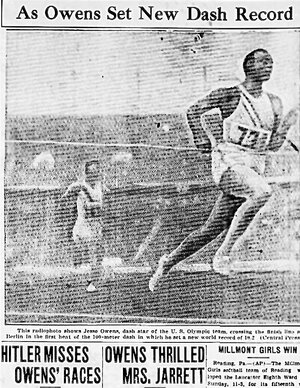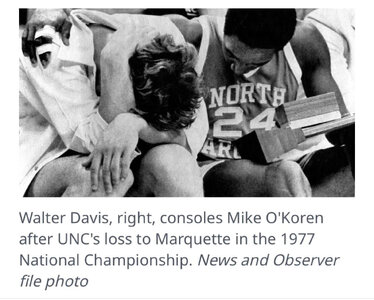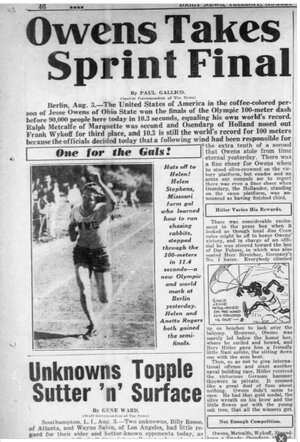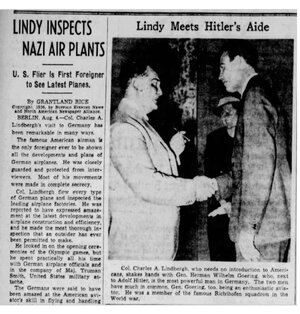- Messages
- 2,761
So this is a big one for Ole Roy
Follow along with the video below to see how to install our site as a web app on your home screen.
Note: This feature may not be available in some browsers.
So this is a big one for Ole Roy

Sweet D Left This Mortal Coil
Here’s remembering..,
The 1976-77 Carolina Men’s Tar Heel Basketball Team carried us along in their wake through a March Mad with Miracles. As a freshman in Chapel Hill I - gloriously - have never recovered. In those days the Atlantic Coast Conference was a compact league of 7 bitter rivals — UNC, Wake, State, dook, Clemson, Virginia, and Maryland. We played one another twice - home and away - and rival arenas were pits packed with palpably intense loathing and deafening vitriol.
An interesting footnote to the texture of seasons in those times were the schedules interspersed with non-conference matches not just early but throughout. Small leagues made that sort of play possible. In ‘76-77 after the ACC season started Carolina had games with Georgia Tech, Furman, Tulane, South Florida, and Louisville. Oh, and in North Carolina we STARTED off with The Big Four Tournament - the very first games of the season - in Greensboro - a blood and guts kickoff between Carolina, wake, state, and dook. This meant 3 guaranteed games between the four in-state powers every year (a fourth might come in the ACC Tournament). Those were some heavenly days. In ‘76-77 after a solid thumping of the wolpfack in the opener, UNC lost the Big Four Championship in overtime to Wake Forest (96-97). Grudges were renewed all around.
Carolina won 11 straight after that loss until being tripped up in a revenge game to State in mid-January at mean, nasty, barnlike Reynolds Coliseum, 73-75. That one hurt but payback would come - in that very spot for Clyde Austin and state college in 1979 by the quick hands of then bench bound freshman Dudley Bradley - but that half court pickpocket was still in the future in 1977. That State game led to The Tar Heels dropping another tilt to Wake and an embarrassing loss to Clemson in Littlejohn (talk about a PIT) before Coach Smith righted the ship and led his charges to 15 wins in a row and a Final Four Championship game versus Marquette in Atlanta.
The final 6 wins, all in March, of that 15 victory streak were particularly remarkable and for a freshman from #DeepChatham made memories still bold over 45 years later. The ACC Tournament saw UNC with a bye by virtue of a 9-3 first place finish and a second round meeting with State - the fourth of the season. Carolina actually dispatched the Wolfpack easily and followed that up with a championship win over a Marc Ivaroni-led Virginia. It was March 5.
The NCAA opened with a Carolina/Purdue match-up in Raleighwood in the previously mentioned old barn - and it was a burner. Playing without injured star Walter Davis UNC prevailed 69-66. Center Tommy LaGarde was also out - and would not return that season. At the buzzer we went pretty wild back in Chapel Hill. It had been close.
Next game up was in College Park - another crackerbox and home to the Maryland Terrapins - yet another hated conference rival. The foes were the Fighting Irish of Notre Dame led by mouthy Coach Digger Phelps. The Irish were a muscle team but with Walter Davis playing hurt Carolina rallied from behind and won 79-77. This was my first ‘taking over Franklin Street’ night. A little place called Kirkpatrick’s was my evening venue in those days and we were there until far past Last Call that night.
There was no time to rest though because March 19 meant a Blue Blood struggle against Kentucky - since Coach Smith’s upset victory over racist Rupp in 1962 the waters had been roiled - as they remain - between the Tar Heels and the Wildcats. UK had an early version of the Twin Towers in Robey and Phillips and Givens was a star. There was controversy and rough play - Davis led the scoring with 21 and Carolina’s freshmen tandem, O’Koren and Yonakor (Class of 1980 like me) came through. Zaliagaris was a particularly stalwart soul and with Phil Ford limited to 15 minutes of court time due to a hyper-extended elbow, #15, John Kuester stepped in and ran the Four Corners Offense to perfection. Kentucky fell 79-72. In Chapel Hill we once again hit the streets.
For the next two weeks the student body took to taping together their middle and index fingers on their right hand in solidarity with their injured hero Sweet D. (H/T Arnold Watkins for the recollection)
This ship was beginning to look unsinkable. Charmed perhaps. And now - with stars Ford and Davis at three-quarter speed and center Tommy LaGarde’s last court time far in the past Coach Smith was proving wiley beyond our wildest dreams at the helm. So this improbable squad was on to the Final Four which featured Nevada-Las Vegas, shirt-tailed Marquette, and from down highway 49, Cornbread’s UNC Charlotte.
Back in Chapel Hill Yonakor and O’Koren had earned a lot of campus cred with both their hustle and around town antics. The team had captured all our hearts and minds in The Southern Part of Heaven heading into the Saturday night game against UNLV. Of course Ford was our captain and Walter Davis an equally beloved hero - both were injured but soldiering on. And Kuester - in the Semis and versus UNLV he proved the glue that held it all together.
Heading into the Monday night final against Marquette it was the walking wounded (Carolina) meeting the Cinderella (Marquette) - the calm calculator (Smith) versus the wild man of Milwaukee (Al McGuire). My Psychology 10 professor had the cluelessness to schedule a test for Tuesday morning (I have no idea how many showed - I know that I did not). We lost and all was sadness in town and on campus. McGuire’s announcement to retire after the game was too much ‘win it for the gipper’ for Carolina. That and Ford’s elbow and Sweet D’s broken finger. It hurt a lot.
Davis, Kuester, and LaGarde graduated and played pro (even Kuester). Walter Davis, of the tying 35-footer his freshman year in the legendary 8 points in 17 seconds game, went on to be a 6-time NBA All Star with his jersey retired in Phoenix. He won a Gold Medal in the 1976 Olympics where his coach was Dean Smith. He was a huge part of the team that made my freshman year at Carolina so incredible. As the springtime slowly sprung that year in Chapel Hill Sweet D and Company took us on a ride that set the tone. Many others would do likewise - still do - most recently the 2021-22 squad whose essence was reminiscent in its miraculousness.
If you know me then you know that I put great stock in how one ‘plays the game.’ One’s sense of fairness and values shine through in competition and teamwork. Now Walter Davis is gone - Tom Zaliagaris and Rich Yonakor from that team preceded him and of course Coach Smith left us in 2015. Of course we’re also reminded by such titans of mortal flaws and the impermanence of it all. It’s a wake up call when folks - your contemporaries - pass on - even more so when once upon a time they lifted your spirit with heroic deeds and gave you moments, now memories, that altered the path of your life.

Shouldn't this be classified as UNC Sports???
The Hitler snubbing Owens thing is a bit of a myth drummed up by newspapers of the day, at least according to Owens.
The 1936 Berlin Olympics ran August 1 through 16. They served as a propaganda showcase for Hitler’s Germany and heartened racist White Supremacists around the world. Fascism was on display everywhere in all its pomp and gold-plated shallowness and a sparkling new 100,000 seat stadium coupled with a constant barrage of militarist celebrations and parades to titillate economically beleaguered radio and film newsreel audiences throughout the planet. Despite the economic ravages of The Great Depression, Hitler’s government spent $30 million ($720 million today) on the games.
Germany had also prepared their youth well and took 101 medals, far out-performing all other nations. The USA took a distant second with 57 awards. The world’s #1 Fascist presided over the games, basking in the attention. A facade was laid out for the incurious, the uninformed, and willingly blind - anti-Jewish signage was removed for the moment. Just the same, over 800 Roma were rounded up and locked away (Concentration Camps had been in operation since 1933 holding Communists, Social Democrats, and trade unionists though many of that number were Jewish - i.e., those most on the vanguard of opposition to fascism).
Looking at newspapers from the Summer of ‘36 I see alarm for Hitler’s rearming of Germany but there also appears a kind of fascination with the face of it all - in the crisp, martial, fanciness. And of course, the success on the track and playing field. Fascism was, after all, international, the German American Bund had just formed in March, William Dudley Pelley of Asheville had created his Silver Legion even earlier in 1933, and in England Oswald Mosley had founded the British Union of Fascists in 1932. Of course Mussolini had kicked it off in late 1920s Italy, and in the Asian Pacific, Japan had embarked on their own homegrown brand of racist authoritarian militarism in the previous decade. Less blatantl, Jim Crow was, in many ways, a potential ally across the American South and anti-semitism and xenophobia was rampant enough for worry in other regions. The world in 1936 was rife with intolerance and far too many were self-absorbed, off-balance, or uncaring.
Two American athletes in particular had come to the attention of the world that Summer. In June, Joe Louis, the #1 ranked Heavyweight in the world fell in 12 rounds to German Max Schmeling in a much ballyhooed Yankee Stadium bout. For many the message was that Aryan supremacy and fascism had laid low diversity and democracy. It was a triumph for Hitler and racism, indeed, and Jim Crow proponents smirked smugly. (Louis knocked out Schmeling in the first round in their 1939 rematch when fascism loomed larger and the nationalism of some American racists meant the could cheer the success of “The Brown Bomber”).
The other African American athlete that captured the world that Summer did it on the Nazi home field. Jesse Owens streaked into Berlin and ran for three gold medals and leaped for a fourth. As the fastest man on earth, Owens put the lie to the Aryan mythology. Hitler snubbed Owens and the Great Star’s grace, pragmatism, and quiet defiance won the admiration of the thoughtful around the world. Of course, Owens was treated little better when he returned to the U.S., a champion but still a ‘second class citizen’ in law and custom in so many ways.
In those days much about America Was Not Great. Perhaps the greatest element to our national character was the progression shown in eventually emerging from our own jousts with the retrogression of racist ideology with palpable successes. Crushing fascism the first time was certainly a victory. We would do well to heed our historical record and move forward through it rather than backward into it.

Fun fact I saw a few months ago about the snub of Jesse Owens. On the 1st day of the games, hitler greeted german athletes only. He was told he had to greet all or none. He chose none and didn’t shake hands with any athlete after the 1st day.Hitler snubbed Owens and the Great Star’s grace, pragmatism, and quiet defiance won the admiration of the thoughtful around the world. Of course, Owens was treated little better when he returned to the U.S., a champion but still a ‘second class citizen’ in law and custom in so many ways.


Exactly right Don. FDR was caught between a rock and a hard place when it came to issues of race. He needed the southern senators and house leaders who controlled the committees to get important legislation passed. He was approached by Eleanor and black leaders to push an anti lynching bill. He told them that, while he certainly agreed that such legislation was needed, he couldn’t afford to alienate the southern congressional leaders. He basically told them that now (during WWII) was not the time to push for such a bill.
Hitler definitely snubbed Owens as he saw that he’d likely be caught in a photograph with him if he continued publicly contacting/greeting any athletes as he did with Germans (the Britannica link says he also met some Finns) on Day #1. The papers at the time took note accurately of this to my reading of them.
The coverage in northern vs southern papers was noticeably different by the way, the War in Spain was making headlines at the time and Lindbergh’s presence in Germany was also big news.
Of course it is more complicated and FDR most certainly did snub Owens and all of the AFAM Olympians. Jim Crow was strong and racism systemic as it remains. FDR’s Democratic Party coalition required that he do nothing to alienate Boll Weevils. To do so would have jeopardized the New Deal and even his own reelection.

Apropos of nothing, "On old Olympus' towering top, a Finn and German viewed some hops.". . .. Hitler definitely snubbed Owens as he saw that he’d likely be caught in a photograph with him if he continued publicly contacting/greeting any athletes as he did with Germans (the Britannica link says he also met some Finns) on Day #1. . .
I guess you could say Hitler's snubbed Owens but I think the implication is that Hitler snubbed Owens because he was black but based on the evidence it looks like Hitler snubbed Owens because he was not German or Finnish.
Hitler definitely snubbed Owens as he saw that he’d likely be caught in a photograph with him if he continued publicly contacting/greeting any athletes as he did with Germans (the Britannica link says he also met some Finns) on Day #1. The papers at the time took note accurately of this to my reading of them.
The coverage in northern vs southern papers was noticeably different by the way, the War in Spain was making headlines at the time and Lindbergh’s presence in Germany was also big news.
Of course it is more complicated and FDR most certainly did snub Owens and all of the AFAM Olympians. Jim Crow was strong and racism systemic as it remains. FDR’s Democratic Party coalition required that he do nothing to alienate Boll Weevils. To do so would have jeopardized the New Deal and even his own reelection.

Close. Roosevelt stayed silent on efforts to get the anti-lynching bill signed starting in 1934, 8 years before we entered WW2 and 6 years before it started in Europe. Roosevelt balked because he wanted Southern Senators' support for New deal programs.Exactly right Don. FDR was caught between a rock and a hard place when it came to issues of race. He needed the southern senators and house leaders who controlled the committees to get important legislation passed. He was approached by Eleanor and black leaders to push an anti lynching bill. He told them that, while he certainly agreed that such legislation was needed, he couldn’t afford to alienate the southern congressional leaders. He basically told them that now (during WWII) was not the time to push for such a bill.
the push for an anti lynching bill did start before the war. But it gained momentum during the war. Black leaders became more aggressive in their civil rights demands then. They saw the sacrifices black men were making during the war and wanted blacks to be treated more equally.Close. Roosevelt stayed silent on efforts to get the anti-lynching bill signed starting in 1934, 8 years before we entered WW2 and 6 years before it started in Europe. Roosevelt balled because he wanted Southern Senator's support for New deal programs.
Roosevelt did implement a meaningful compromise by having the justice department investigate lynchings instead of local Southern officials. This and other measures led to a sharp decline on lynchings starting around 1935.
If it gained momentum, it didn't gain much. It wasn't until 2022 that a similar anti-lynching bill was signed by Joe Biden.the push for an anti lynching bill did start before the war. But it gained momentum during the war. Black leaders became more aggressive in their civil rights demands then. They saw the sacrifices black men were making during the war and wanted blacks to be treated more equally.
What statement would have been made in 1980 that wasn't because of the boycott? Maybe the boycott was the right thing to do or maybe not, but it's got nothing to do with Jesse Owens.Among the many stupid decisions made during the Carter administration the decision to boycott the Olympics in Russia ranked near the top. If Roosevelt had made a similar decision Jesse Owens would have never had his chance to make his statement regarding Aryan supremacy.
My thoughts about FDR are best summarized by: don't judge him by the standards of today. Judge him by the standards, norms, and priorities of when he was alive. Judging FDR by the standards of today would be like criticizing him for not doing enough to facilitate getting the World Wide Web up and runnning. FDR had lots of faults and shortcomings, just like everyone else, but I am not going to criticize anyone for making the decision to prioritize (a) getting the economy restarted during the 1930's and (b) prioritizing the war in Europe in the 1940's. Based on what was known and knowable at the time the decisions were made, I believe he made the correct choices. I do not believe the world would be a better place today if FDR had decided the best course of action was to let Germany and the Sooviet Union exhaust themselves fighting each other and the US could mop up whatever remmants were left.If it gained momentum, it didn't gain much. It wasn't until 2020 that a similar anti-lynching bill was signed by Joe Biden.
But Roosevelt did drive real meaningful actions during world war II including contracting rules that ensured blacks had a fair shot at defense jobs and the appointment of a large number of sympathetic federal prosecutors and judges.
Who knows? But depriving our athletes the chance to compete achieved nothing. Plus the ripple effect was the Russians boycotting the next Olympics.What statement would have been made in 1980 that wasn't because of the boycott? Maybe the boycott was the right thing to do or maybe not, but it's got nothing to do with Jesse Owens.
There was significant debate on the US boycotting the Nazi Olympics at the time. But ultimately, the US delegation attended and you have the symbols of Lewis and Owens winning.Who knows? But depriving our athletes the chance to compete achieved nothing. Plus the ripple effect was the Russians boycotting the next Olympics.
Neither Joe Louis nor Max Schmeling fought in the 1936 Olympics; each had been a professional for several years by 1936. Schmeling did beat Louis in a bout in 1936.There was significant debate on the US boycotting the Nazi Olympics at the time. But ultimately, the US delegation attended and you have the symbols of Lewis and Owens winning.
